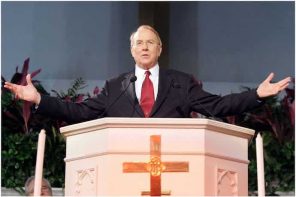What is with NPR these days? They’re famously held to be a bastion of liberal reporting, but you wouldn’t know it by listening to their weekend morning shows. Last week, I caught Scott Simon helping advance the discredited theory of liberal decline. This week Sunday host Rachel Martin lets Focus on the Family’s Jim Daly go unchallenged.
Daly was on the show to talk about how Focus is facing up to the tide of marriage equality, ahead of this week’s expected Supreme Court ruling on the subject. He did everything he could to project an aw-shucks, kinder and gentler face to Focus, acknowledging the complexity of society and human sexuality, allowing as how gays and lesbians could be Christians and “perfectly good” people, positing homosexuality as a sin like any other. He even interjected a note of humility into the proceedings: “I’m not the author of scripture, obviously,” he told Martin. “I’m just trying to read them and live by them even though I fail.”
And fail he does, slickly conflating two things scripture has to say about marriage, and ignoring a couple of others. Accordingly to Daly, covenant love can only take place in the context of opposite-sex commitment:
We think it’s pretty clear that God’s design for human sexuality is a male and a female committed to one another in marriage, for life. It’s interesting, because Jesus talks about that in Matthew and Mark in the gospels where he restates the Genesis commitment, which is “a man shall leave his mother and father and cleave to his wife, and the two shall become one.” He doesn’t say anything about same-gendered people getting together.
Now, I and others might interpret that Genesis passage (2:24) as emphasizing the covenant aspect of marriage, an issue that goes beyond the particularities of gender. Everybody should be faithful to their partners, in other words, whether it’s a same-sex or heterosexual relationship.
But more conservative readers of scripture see it as setting up heterosexual relationships as normative, part of “God’s design for human sexuality.” That’s fair enough—but it is at the very least a highly debatable point, and the question that goes unasked is, Why should your reading of scripture be the norm for a society that includes many different perspectives, including those who don’t care to have their relationship governed by the book of Genesis?
For that matter, as Daly surely knows, there are many models of marriage in scripture: to name just a few, there’s monogamy, polygamy, Levirate marriage (in which men marry their brothers’ widows), and the practice of kidnapping, raping, and forcibly wedding women taken prisoner in war. Why does only one of those count as “God’s design”?
Beyond that, the passages of Matthew (19:3-12) and Mark (10:1-12) that Daly picks out are teachings on divorce, not same-sex relationships. Daly’s quite right that Jesus doesn’t say anything about homosexual partnerships. The question put to him is, “Is it legal for a man to divorce his wife?” and that’s the question he answers.
Yet you won’t find a mention of divorce on the Focus website’s Social Issues page, or in its section on Defending Traditional Values. Why is that, do you suppose? Why is same-sex marriage an immense threat to American culture, but opposite-sex divorce—the issue that Jesus himself addressed—not worth fighting on Capitol Hill? Focus on the Family is apparently willing to leave it to the states to come up with answers on the question. Why? What makes it different than same-sex marriage? These are all good questions, but again, they go unasked.
Likewise, Daly relates a conversation he had with Chai Feldblum, a Commissioner at the EEOC, to show how opponents of Focus’ position want a world in which workers at county courthouses could be fired for refusing to validate same-sex marriages, or doctors could lose their license for refusing to “do in vitro fertilization for a lesbian couple.” Daly says,
the underlying issue for all of us to consider is that this is going to be deeper than just two people who love each other getting married or having civil union. There’s a whole host of religious freedom issues underneath this that in essence, we won’t tolerate religious expression any longer, certainly not over sexual preference.
We could spend all day dissecting why this is wrong, but let’s stick with a question Rachel Martin didn’t ask: why should Feldblum, the daughter of a rabbi, be constrained by Daly’s reading of the Bible? Or again, why, if you removed the words “same-sex” from his equation and replaced it with “Jewish,” or “black,” would the argument be tolerated for more than thirty seconds? The fact of the matter is that Americans live in a society where not everyone shares the same religious commitments. That’s why we have religion-neutral statues: to protect religious freedom. Daly is making the argument that laws concerning marriage should grant a positive freedom to his religious tradition. In other words, people who agree with Jim Daly should have the right to define for everyone what marriage means. That’s an interesting argument, and one that connects to conservative positions on reproduction in the ACA, among other things. Daly’s certainly entitled to make it if he wants.
But I and other NPR listeners are entitled to a full consideration of his case. Daly makes no good argument, no argument at all, really, for why anyone who doesn’t already share his beliefs should agree with him. I’d really like to hear his answer to that question. Too bad nobody thought to ask him.




